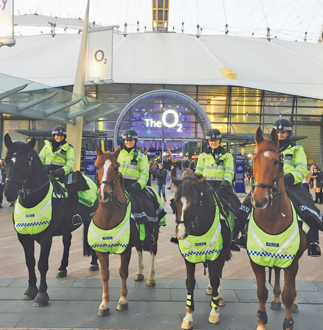Richard Latham, the Head of Security at The O2 in London, recently invited Professional Security Magazine MD Roy Cooper to visit.
Richard, a former military man, is a networker. He’s worked operationally with police and others, and still does; by having good contacts he can arrange things that suit both parties. The occasion for Professional Security’s visit was a weekend police deployment different from the norm (picture; by Sam Cooper). While The O2 does have a police team that it funds, that out of the ordinary deployment amounted to a five-figure piece of policing, that would reassure visitors that day. It was an example of Project Servator, the police tactic to deploy various assets, that Professional Security has featured ever since 2013, among other places at the Glasgow Commonwealth Games, London mainline railway stations, Sellafield and most recently at the Intu shopping centre at Lakeside in Essex. Briefly to explain Servator, the police describe it as ‘unpredictable and highly visible deployments’, that could include dogs and handlers; uniformed or covert officers; or plain clothed officers trained in behavioural detection (for noticing the subtle, sometimes unconscious ways in which people behave differently when they are stressed or anxious); or, as in this case at The O2, mounted police. Servator among other things engages with locals, whether farmers and villagers in the case of Sellafield or shop staff in cities, to encourage them to report anything suspicious; and seeks to reassure people (and checks by surveying people) about the reason for the deployment, instead of running the risk of such visible policing only making passers-by wonder if something is the matter.
In other words, The O2 is tapping into a national policing and security effort (most recently, Essex Police recently began applying it in Colchester); but like so much in life, it doesn’t just happen. It takes the cultivation of personal contacts, from the local Met Police to various government agencies. You can’t press a button and that happens.
Customer service
So, that is what Richard has brought to The O2; but that also had to be applied in the right way, to fit with the way The O2 goes about its business. On that Richard said: “Customer service is crucially important to us,” and he added that customer service is a tool in defeating terrorism. To counter hostile reconnaissance by a potential terrorist, doesn’t only take anti-ram bollards, and CCTV (something that didn’t crop up in conversation) – although The O2 has all the usual physical and electronic site security. As Richard put it, countering terrorism is staff saying “Can I help you sir?”
To leave Richard for a moment, isn’t this the same principle as in retail loss prevention, that the shoplifter is put off by a shop assistant smiling and asking ‘can I help’ and offering a basket and by impeccable customer service taking an interest in that thief, who is freaked because the thing he wants above all is to be anonymous, so he can go about his wrong-doing undisturbed?! It’s intriguing then, how simple and low-tech countering terrorism can be, in part; at entertainment and sports venues such as The O2, and generally.
Full story and more pictures in the February 2018 print issue of Professional Security.









